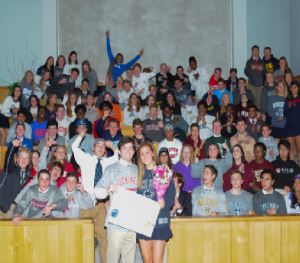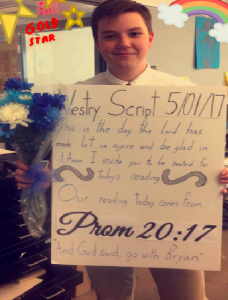Jillian Rotman ’18: With prom quickly approaching in June, students on campus are buzzing with constant, elaborate “promposals.” These public displays, often involving flowers, clever signs, and even stuffed animals have become a trend in high schools all around the country. On the surface, these proposals may seem harmless, but they have the potential to disrupt the school environment, pressure the members of the student body, and turn into a competition for the best dates and execution of the proposal.

It is easy to understand why promposals are such a common occurrence. With technology all around us, promposals are quickly and easily documented through social media. Promposals provide students with an opportunity to show they care about the person they are asking to prom; a chance to express their feelings and possibly romantic side. There is no disputing that promposals can be chivalrous. English teacher, Tony Herman, acknowledges their downsides, but admits, “When I see someone asking someone to prom, I always think that’s kinda nice. It’s a nice moment in the day.” With prom as a milestone and rite of passage for high schoolers, students often go overboard in trying to make it something special. Hours of time are spent each year planning the meticulous details to achieve the perfect prom experience. Promposals mark the beginning of the prom adventures, and the attention that they draw can be appealing.
Though promposals are supposed to be heartfelt, they are often executed for the wrong reasons. With more and more promposals being documented, students aim to have the best promposal rather than the promposal for a specific person. The act of asking someone to prom can easily transform into a competition for the most expensive or original promposal. It is easy to forget that the actual prom is more important than the promposal. As Ella Zomber ‘19 says, “Prom is only one night.” Promposals can be anticlimactic, with the excitement of prom beginning and ending before the prom even happens. These proposals of sorts should not rival real life proposals, but they are beginning to involve too much commitment.

Other downsides to promposals are the pressures they can put on already-overwhelmed students. Lauren Golden, French Teacher claims, “Promposals are pretty outrageous.” She continued, “While I think they’re pretty cute, I also feel that they’re unnecessary and that they can make people feel left out if they have not been invited. I feel that it should be very casual in high school; you should be able to go to the prom by yourself or with a group of friends.” Promposals promote exclusion; if someone does not receive a promposal, they may opt out of attending prom because they have no date. There is also the fact that many kids feel pressured to accept a promposal because promposals have become a spectacle. The person asking may have a fear of rejection and may be publically humiliated. It would be much easier for someone to casually ask their friend or significant other to prom. This would also allow for the person being asked to politely decline without causing a scene.
When a promposal occurs on campus, students often gather around to view the spectacle. This does not seem like a big deal, but when it happens often it can create a large distraction. In the midst of AP testing, preparation for finals, and the spring sport season, promposals can add to the confusion and turn hectic. Class emails from form deans have been used as constant reminders not to conduct promposals during class. Katie Crager ‘18 in talking about promposals at school, stated “…they [promposals] seem to make everyone uncomfortable.” There is a fine line between a cute promposal and an awkward one, and the growing culture of large scale promposals often shifts the scales toward awkward.
The promposals at Episcopal contribute negatively to the collective school community. These promposals should be avoided from happening at school, or at least scaled back considerably. The removal of these proposals from social media and the school community would better help develop a judgement free zone and an ideal school experience. If conducted privately, proposals could become more meaningful, personal, and well-intended.